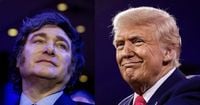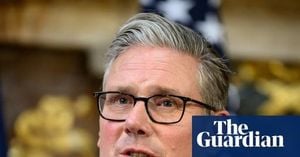Argentine President Javier Milei is set for a whirlwind week on the world stage, with a tightly packed agenda that underscores both his administration’s international ambitions and the economic pressures facing his country. Beginning Sunday, September 21, 2025, Milei will embark on his twelfth visit to the United States since taking office just under two years ago—a striking testament to how central Washington has become in Argentina’s foreign policy playbook, according to Bloomberg Línea and official Argentine government sources.
Milei and his official entourage will depart Buenos Aires at 23:00 local time (2:00 GMT, September 22), landing in New York City at 9:30 a.m. (12:30 GMT) on Monday. The trip’s significance is heightened by a series of high-profile meetings and appearances, most notably with U.S. President Donald Trump and Israeli Prime Minister Benjamin Netanyahu. But looming over the diplomatic choreography is Argentina’s urgent quest for financial support, as the country wrestles with a currency crisis and mounting international payments.
Monday’s agenda kicks off with economic diplomacy. Milei will meet Kristalina Georgieva, director of the International Monetary Fund (IMF), accompanied by key figures from his administration: Chancellor Gerardo Werthein, Economy Minister Luis Caputo, Secretary General Karina Milei, and Communications Secretary Manuel Adorni. Later that day, the president will confer with economists Alberto Ades and Xavier Sala i Martín, reflecting his penchant for seeking outside expertise as he navigates Argentina’s economic woes.
The backdrop to these meetings is a deepening crisis for the Argentine peso. As Bloomberg Línea reported, following legislative elections in Buenos Aires province earlier this month, the currency slid to the upper limit of the Central Bank’s intervention band, sparking a new wave of market anxiety. The government is scrambling to shore up confidence and, crucially, to secure the funds needed for major debt payments: about $4 billion due in January 2026 and another $4.5 billion in July.
To that end, Milei’s administration is negotiating access to a credit line from the U.S. Exchange Stabilization Fund (ESF), a program typically used by Washington to support countries facing external shocks. “We are working very strongly to make this happen, and I am optimistic about it,” Milei told La Voz Del Interior, adding, “We are very advanced; it’s just a matter of time.” The president explained his government had anticipated a challenging year and began developing strategies to cover these looming payments months ago. The possibility of a U.S. Treasury credit line was first reported by Ámbito Financiero a month earlier, and speculation intensified after U.S. Treasury Secretary Scott Bessent’s visit to Argentina in April 2025. According to Bloomberg News, Bessent indicated at a JPMorgan event that the Trump administration would be willing to offer such support if a global crisis threatened Milei’s economic reforms.
Tuesday, September 23, brings the political centerpiece of the trip: a bilateral meeting with President Donald Trump in New York City, confirmed by presidential spokesman Manuel Adorni on X (formerly Twitter). The encounter is more than a diplomatic courtesy. It follows their February 2025 meeting at the Conservative Political Action Conference (CPAC) in Maryland, where, as Bloomberg Línea recounted, the two leaders discussed Milei’s “innovative” economic reforms, prospects for closer U.S.-Argentina cooperation, and the possibility of a reciprocal trade agreement. The Argentine Foreign Ministry emphasized the “solid bilateral relationship and shared commitment to deepening strategic ties,” framing the meeting as a pivotal moment for both countries.
That same day, Milei will attend Trump’s address to the United Nations General Assembly, a symbolic gesture underscoring Argentina’s alignment with the U.S. on the world stage. The following day, Wednesday, September 24, Milei himself will address the General Assembly for the second year in a row, offering him a global platform to advocate his economic vision and international priorities.
The diplomatic marathon continues that evening with the Atlantic Council’s 2025 Global Citizen Award ceremony, where Milei will participate in celebrations presided over by U.S. Treasury Secretary Scott Bessent. The event is expected to gather influential policymakers and business leaders, offering Milei yet another opportunity to pitch Argentina’s case to potential allies and investors.
But the week’s itinerary isn’t limited to Washington and Wall Street. On Thursday, September 25, at 16:45 Argentina time (19:45 GMT), Milei will meet with Israeli Prime Minister Benjamin Netanyahu, also in the United States. The relationship between the two leaders has grown notably close. Milei has expressed “unconditional alignment” with Netanyahu’s policies, particularly regarding Israel’s military offensive in the Gaza Strip—a campaign that, according to official sources cited by BBC, has resulted in approximately 63,000 Palestinian deaths and 158,000 injuries. During his most recent visit to Israel, Milei reaffirmed his intention to move Argentina’s embassy from Herzliya to Jerusalem, a move that would mark a major diplomatic shift and signal strong support for Netanyahu’s government. He also criticized what he called the international community’s inversion of “the category of victim and perpetrator” in the conflict with Hamas.
Following the Netanyahu meeting, Milei’s schedule includes the B’nai B’rith award ceremony and meetings with Donald S. Lauder, president of the World Jewish Congress, and Claudio Epelman, director of the Latin American Jewish Council. These engagements further highlight Milei’s efforts to strengthen ties with Jewish organizations and underscore his pro-Israel stance.
All told, this marks Milei’s fourth trip to the U.S. in 2025 alone—previous visits included Trump’s inauguration in January, CPAC in February, and an April trip to Florida to receive an award. The frequency of these visits, as well as the high-level meetings packed into each itinerary, reflect both the urgency of Argentina’s economic situation and the president’s determination to secure international backing for his agenda.
Yet, for all the diplomatic pageantry, the stakes remain high. The Argentine public and international observers alike will be watching closely to see if Milei’s efforts yield tangible results—especially in the form of financial support from Washington. As the president himself acknowledged, “We are very advanced; it’s just a matter of time.” Whether that optimism will translate into the lifeline Argentina needs is a question that will define not just this week, but the months to come.




